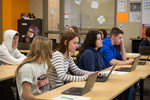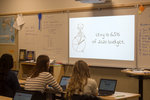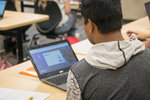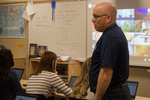



The students at Centralia High School and middle school participated in a mock election last week to vote on whether or not they would pass the school district’s levy on the Feb. 11 special election.
The current Centralia School District levy expires at the end of 2020. The district is asking for a levy increasing from $1.50 to $2.50 per $1,000 in assessed property value.
The replacement levy will generate approximately $6.6 million in local revenue. The district’s bond rate will decrease to $1.65 per $1,000, according to information on the Centralia School District website.
The students voted at the start of class after watching a short informational video that explained what a levy is, how it helps support the school, and how much it will cost someone who owns a $200,000 home.
Ed Petersen, Communications and Public Relations Coordinator for the Centralia School District said that the mock levy election is a good way to introduce students to taxes, voting and the kinds of decisions they are going to face in their adult life.
The mock ballot used the same kind of language that will be used on the real ballot so that when the students vote in the future, they will be familiar with the format.
The students watched a video explaining what a levy is, what a levy does, and how much it costs. The levy is defined as “a type of property tax approved by voters to fund programs and activities in our schools.” The video puts the tax into an example — a family owning a house worth $200,000 will pay $500 per year.
The students pulled up the ballots on the school-provided Chromebooks which were provided mostly by the past levy funds. Petersen said that the high school has about 3,000 Chromebooks in use which have approximately a six-year life span. He said that the Chromebooks have been useful in a number of ways and aid in student learning.
Evie Rooklidge, a Centralia High School student who participated in the mock levy election in her social studies class, said that she is glad she learning about taxes before she enters the real world.
“It’s more tax than I thought, but I think that since its paying for things that students are involved in, like I’m involved in sports, for example, so I think it’s understandable,” said Rooklidge.
The results of the mock levy election showed that out of 521 total responses, 63.5 percent of students voted in favor of the levy and 36.5 percent voted against it.